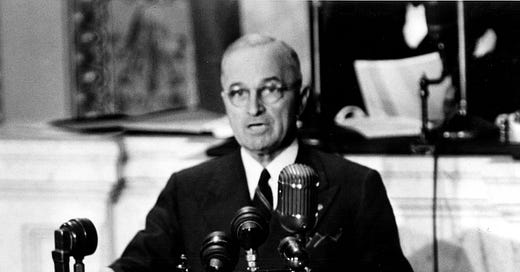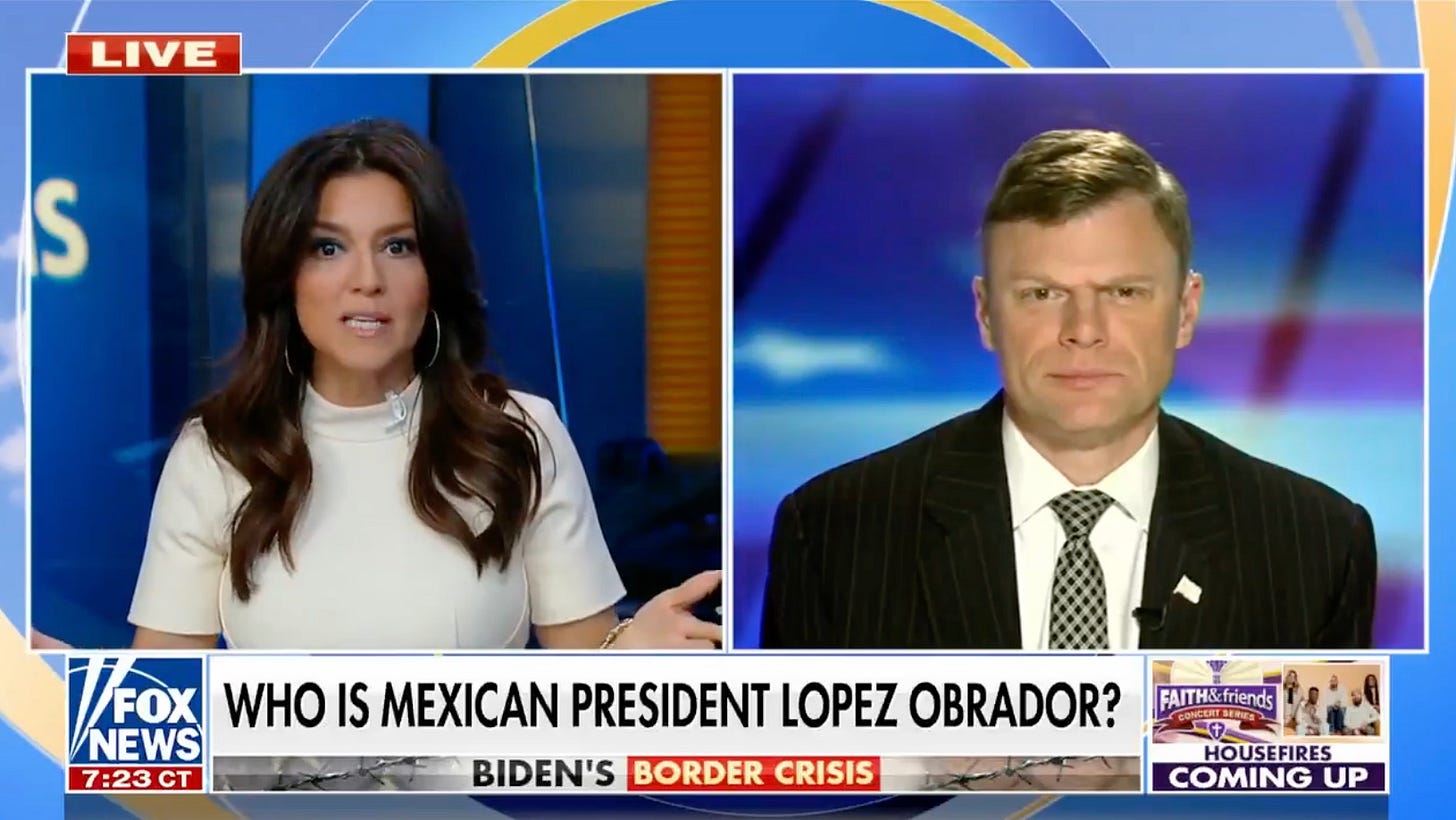Congress Moves, But Biden Still Has No China Policy
New China Committee starts strong, but faces limitations

Mike Gallagher, the 39-year-old former Marine congressman from Wisconsin, recently chaired the first hearing of potentially game-changing effort in Congress. Known technically as the “Select Committee on the Chinese Communist Party,” everyone is just calling it the “China Committee.”
With a touch of unintended irony, the committee’s staff is located not merely in the basement, but the sub-basement of the obscure Tip O’Neill building on the House side of Capitol Hill. Its offices were previously the home of the controversial and partisan January 6 select committee.
The new committee has charted a different path. Republican and Democrat members have gone out of their way to stress bipartisanship with minimal exceptions. Both congressmen and witnesses demonstrated seriousness in examining the various parts of economic, political, and military aggression that China has directed at America despite the hand of friendship that the United States has repeatedly extended over the decades since President Richard Nixon opened relations with Beijing.

Will the committee mark a turning point? Perhaps one of sorts.
When news of the 1941 Japanese attack on Pearl Harbor reached British Prime Minister Winston Churchill, he was as shocked by the carnage as anyone else. But as he later wrote: “Being saturated and satiated with emotion and sensation, I went to bed and slept the sleep of the saved and thankful.” Churchill knew that Britain would no longer stand alone with the Soviet Union against the Axis powers. Thanks to an aroused United States, the New World would once again help rescue the Old. The work that lay ahead was immense, uncertain, and prolonged, but a decisive intention had materialized.
Are we nearing a similar point? With a Congress fairly unified around the seriousness of the China threat, can we say that America’s intention is becoming clear—as is the ultimate outcome of the struggle, whether its culmination is years or decades in the future? After all, once properly motivated and focused, the Free World probably won’t lose an existential struggle to a government run by commies.
But the answer about a turning point is “not yet,” because of the lack of presidential leadership.
By the intentional design of the Founding Fathers, the Congress can play a major role in foreign affairs, but not the decisive role. That is reserved for the president. Even the Founders with their fear of placing too much power in the hand of too few men knew the necessity of this, with Alexander Hamilton writing in the Federalist Papers: “Of all the cares or concerns of government, the direction of war most peculiarly demands those qualities which distinguish the exercise of power by a single hand.” This principle extends to foreign policy generally.
I would challenge any foreign policy expert or normal American voter to explain Joe Biden’s policy toward China. Recently he said of Beijing, “We seek competition, not conflict”—squishy language recycled from as far back as the Clinton administration that imagines China cares what we “seek.”
Last week, Commerce Secretary Gina Raimondo dove further into sweet nothings, telling an audience in India that the United States “does not seek to decouple from China nor does it seek a technological decoupling.” Thus did she tell a friendly democratic country that could be enormously helpful in ending our economic dependence on China that we prefer business as usual with our communist adversary—the same adversary that occasionally fights brutal border incursions with India.
Yesterday, at an event marking Australia’s next step in building nuclear-powered submarines with the reach to be relevant in deterring China, Biden national security advisor Jake Sullivan said: “There is no need for confrontation. There is no need for a new Cold War.” And yet both are in plain sight.
Biden and his aides aren’t alone. None of his predecessors have had a clear China policy either. Donald Trump stopped pretending China was a friend and applied tariffs to many imports, but also concluded a foolish “Phase One” trade deal that Beijing immediately and predictably broke. Trump just wanted a deal with China and did little to bolster defenses in the Pacific. He left office with fewer ships and planes in the region than when he took office.
This reality continued the trend of the Obama administration, which promised a “pivot to Asia” and then a “rebalancing” that never happened. Biden has similarly neglected the Pacific, leaving Taiwan without $19 billion in arms it already purchased from us and a foreign policy that focuses on Europe first, Middle East backwaters like Syria second, and the vastly more important Pacific last.
The American people should not have to wait this long for their president to lay out a strategy to manage what most of them see as the biggest threat to America. In 1947, less than two years after the end of World War II, President Harry Truman addressed the Congress and outlined a doctrine for confronting the menace of Soviet communism. Almost every president since then has used his first year in office to define the major threat facing the free world and his plan for defending America.
Not so with Biden. Less than a month after taking office, the president and his aides talked up a comprehensive review of China that was to result in a big policy announcement. Biden even went to the Pentagon to boast the creation of a task force—almost as super special as a blue ribbon commission—to make “recommendations on U.S. military strategy toward China, technology, and alliances and bilateral defense relations with Beijing.”
From there, the trail goes dark.
Into this vacuum steps the new China Committee. Under the leadership of Rep. Gallagher, himself a likely Secretary of Defense or State in a Republican administration, the committee can accomplish much:
It can illustrate the political, military, and economic threat posed by Beijing, especially to a public that is wary of repeated U.S. foreign policy failures and overcommitment.
It can ask American multinational businesses like Wall Street, Silicon Valley, and Hollywood why they still court Beijing and whether they might instead focus on the planet’s other 7 billion consumers.
It can illustrate past instances where the USA has waged successful political warfare against our adversaries, putting them on the back foot internally with their own populations, and adapt this to the 2020s fight against the Chinese Communist Party.
It can hear arguments about the military we need to deter war with China or prevail if necessary.
But some crucial activities cannot be effected from a committee of Congress or the entire Congress itself. It will take a determined American president to act decisively, such as:
Strategically delinking the U.S. economy from China using steadily increasing tariffs on imports that are too important to be left to an adversary.
Informing Europe that it will pay for its own defense and the war in Ukraine, and moving the U.S. military out of Europe to the Indo-Pacific.
Thwarting China’s excellence at cyber war and data theft by requiring not only U.S. government data but all U.S. private-sector data to be protected with end-to-end encryption and zero-trust principles of software design and management.
Buying more ships, planes, and missiles for service in the Pacific, with an urgent emphasis on what can be fielded quickly and inexpensively.
Rebuilding and testing our nuclear weapons arsenal—untested since 1991—and fielding hypersonic and other survivable methods of delivering warheads—ensuring they hopefully are never used.
Resisting China in key contested geographies, especially Southeast Asia. Offering free association in a U.S.-led economic movement that offers an alternative to Chinese economic dominance—one based on jointly developing energy production, free market reform, and exporting investment and trade capital instead of U.S. manufacturing jobs.
Building a new security architecture in the Middle East with the USA on an equal footing as friendly Arab monarchies that are increasingly well armed—ending the woke human rights crusade against our allies.
Waging political warfare on China’s system of government, spotlighting its illegitimacy and weakness by heralding political prisoners and democratic success stories like Taiwan.
Can Biden pull any of this off? He could, but almost certainly will not. Biden’s instincts on Asia aren’t all bad. He has kept Trump’s tariffs on China and said at least three separate times that he would help Taiwan defend itself if China attacked. But each time, his remarks were walked back immediately by White House staff, who seem to be in charge and wedded to failed China policy.
Most likely the American people will need a new president to explain a coherent China policy to them. In the meantime, the China Committee can at least put options on a pedestal for the public and candidates for office to consider.






Quite a good assessment. China faces troubles of it's own making given a demographic collapse and a foolish CoV policy. That has caused many companies to shift work to Vietnam and India, some even to Mexico and the US. That trend may continue. That starves the government of revenue to build out their military further. OTOH, they already have a fairly strong, but untested, military. We do need to de-couple to speed that transition but I expect it will take a future President to see that happen. I think if Biden is re-elected the uproar will be unbelievable over the obvious tampering.